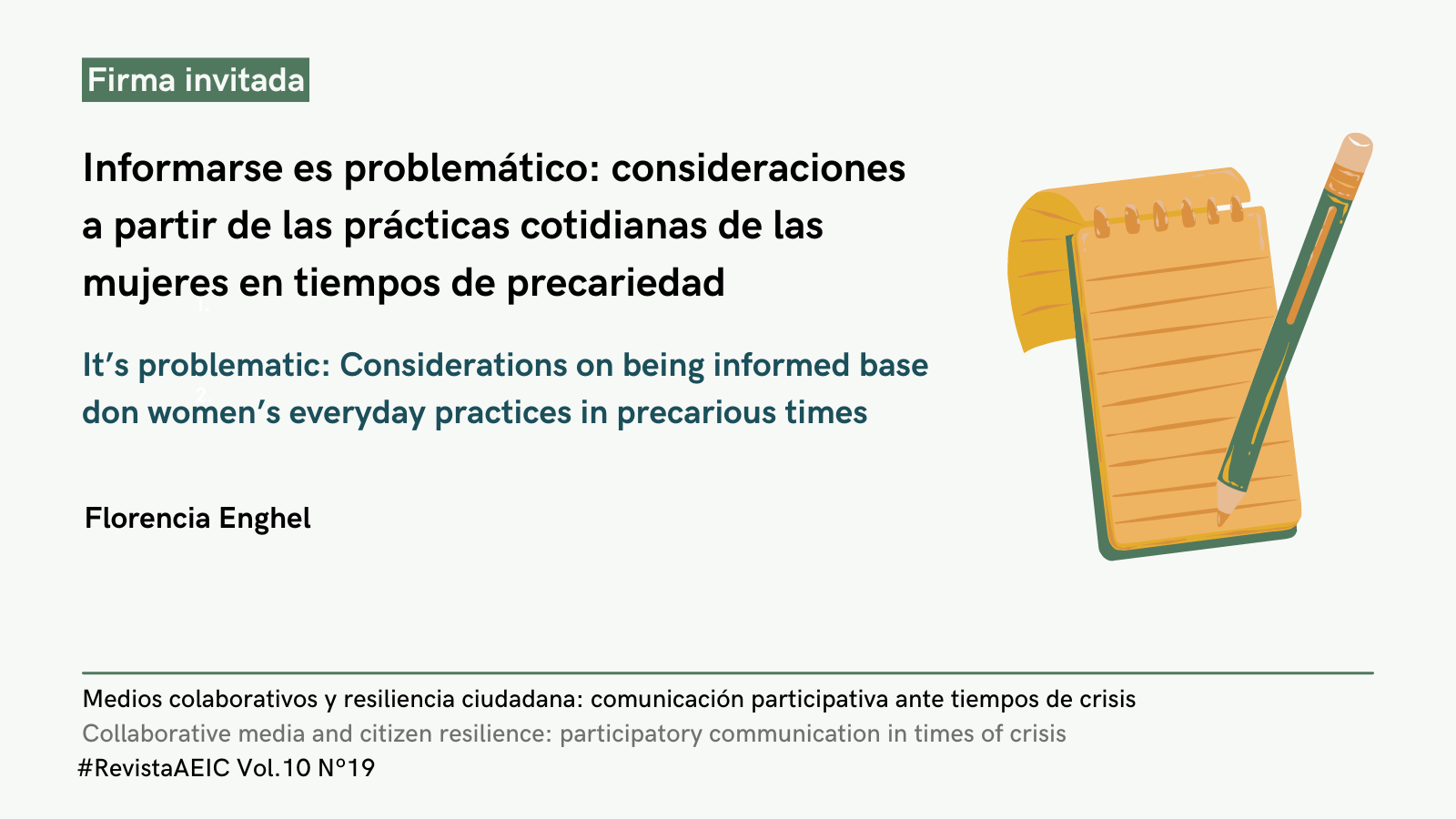It’s problematic: Considerations on being informed base don women’s everyday practices in precarious times
Abstract
Collaborative media can potentially contribute to civic resiliency. But do their target audiences resort to them at present? And if they do, what does said recourse tell us about what it means to get informed today? Based on qualitative interviews conducted with women in Argentina in 2021-2022, I investigate which forms of information they have access to, which media they adopt or reject, and how they stay on top of those issues that particularly affect them. The analysis shows that they find the daily task of informing themselves problematic in various ways. To stay on top of issues that affect them, they resort to distinct practices: they relate to each other, choose collaborative media with a feminist focus, and follow female journalists recognized for their attention to gender issues. The article contributes to rethinking everyday information practices with a gender perspective and the role of collaborative media in information diets aimed at nurturing civic resilience.
Downloads
References
Christoffersen, A. (2017). Intersectional approaches to equality research and data. York: Equality Challenge Unit.
DataReportal (2021). Digital 2021 Argentina. DataReportal. Recuperado de https://datareportal.com/reports/digital-2021-argentina
Enghel, F. (2022). Vida cotidiana y justicia de género en Argentina: Prácticas comunicacionales durante la pandemia. InMediaciones De La Comunicación, 17(2). https://doi.org/10.18861/ic.2022.17.2.3336
García Canclini, N. (2007). Lectores, espectadores e internautas. Gedisa: Barcelona.
Goetz, A. M. (2007). Gender justice, citizenship and entitlements: Core concepts, central debates new directions for research. En M. Mukhopadhyay y N. Singh (eds.) Gender Justice, Citizenship, and Development (pp. 15-57). Ottawa: International Development Research Centre.
Hunting, G. (2014). Intersectionality-informed qualitative research: A primer. Vancouver: Institute for intersectionality research and policy.
INDEC (2022). Índice de precios al consumidor (cobertura nacional, diciembre) Vol. 7, N 1.
Krajina, Z. Moores, S. y Morley, D. (2014). Non-media-centric studies: A cross-generational conversation. European Journal of Cultural Studies. 17(6), 682–700. https://doi.org/10.1177/1367549414526733
Lorey, I. (2016). Estado de inseguridad: gobernar la precariedad. Madrid: Traficantes de sueños.
ELA - Equipo Latinoamericano de Justicia y Género (2020). Los derechos de las mujeres en Argentina en tiempos de Covid-19: Aprendizajes y recomendaciones. Recuperado de https://www.ela.org.ar/c/APP187/53/87/43/4444
Menon, N. (2022). Ver como feminista. Consonni: Bilbao.
Morley, D. (1986). Family Television: Cultural Power and Domestic Leisure. London: Comedia.
Morley, D. (2006). Unanswered questions in audience research. The Communication Review, 9, 101–121.
Morley, D. (2007). Media, Modernity and Technology: The Geography of the New. London: Routledge.
Mouffe, C. (2005). On the political. London: Routledge.
Natale, S. (2016). There are no old media. Journal of Communication, 66, 585-603.
Rodríguez, C. (2009). De medios alternativos a medios ciudadanos: trayectoria teórica de un término. Folios, Revista De La Facultad De Comunicaciones, 21-22, 13–25. Recuperado de https://revistas.udea.edu.co/index.php/folios/article/view/6416
Roy, S. (2016). Women’s movements in the Global South: Towards a scalar analysis. International Journal of Politics, Culture, and Society, 29, 289–306. https://doi.org/10.1007/s10767-016-9226-6
Segura, M. S., Linares, A., Espada, A. Longo, V., Hidalgo, A.L., Traversaro, N. y Vinelli, N. (2018). La multiplicación d ellos medios comunitarios y alternativos en Argentina: Explicaciones, alcances y limitaciones. Revista Internacional de Comunicación y Desarrollo, 9, 88-114. https://doi.org/10.15304/ricd.2.9.5530
Silverstone, R. (2004). Proper Distance: Towards an ethics for cyberspace. En G. Liestil, A. Morrison y T. Rasmussen (eds.), Digital Media Revisited: Theoretical and Conceptual Innovations in Digital Domains. Massachussets: MIT.
Slater, D. (2013). New Media, Development and Globalization: Making Connections in the Global South. Cambridge: Polity Press.
Sud, N. y Sánchez-Ancochea, D. (2022). Southern Discomfort: Interrogating the Category of the Global South. Development and Change, 53(6), 1123–1150. https://doi.org/10.1111/dech.12742
Tacchi, J., Sabiescu, A. y Gordano, C. (2019). Communication and adult education: The communicative ecologies and assemblages framework. En B. Brand y B. Schmidt-Behlau (eds.), The contribution of adult education to active participatory citizenship (International Perspectives in Adult Education N° 79). Bonn: DVV International.
Vega Montiel, A. y Macharia, S. (2018). Setting the gender agenda for communication policy. Paris: UNESCO.




